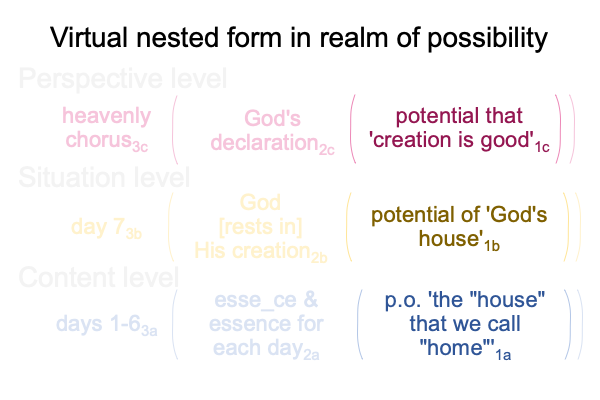0064 What is proposition seven?
Genesis 2.4 starts a sequel to Genesis 1.1-2.3.
The other option, of course, is that Genesis 2.4-4 describes the creation of humans in the image of God in Genesis 1.
This other option is not tenable if…
0065 …Genesis 1-11 runs like a movie.
The opening is cosmological, ending with the heavenly chorus3c celebrating God resting in His Creation2b on the seventh day3b, despite backroom drama of the angels who reject the creative project that God initiates.
Then, the camera winds its way down to a little island at the northern edge of the Persian Gulf. Eden starts as a mudflat. Then, lush vegetation grows upon the river-deposited soil. Then, God walks through his strange, spontaneously-formed garden and says, “This looks good.”
0066 Walton’s argument turns on the Hebrew word, “toledot”, meaning “account”. Genesis 2.4 offers a second account…
… and modern scientists cry, “Foul.”
0067 There are no breaks in human evolution. The biblical authors cannot have it both ways. Neither geneticists nor natural historians observe changes corresponding to a bottleneck consisting in a pair of two founders.
In response, intimidated Christians try to place Adam and Eve deep into the evolutionary record. Adam and Eve live sometime after the domestication of fire and sometime before the appearance of anatomically modern humans in the fossil record.
0068 But, look at the text. The biblical authors can have it both ways.
Genesis starts with a magnificent overture, expressing the esse_ce and essence of the “house” that we call “home”, which is also God’s abode, which is also “good”, in a way that defies the projections of idealists and elitists into the spoken word, “good”.
Then, Genesis continues with a scene where God creates Adam and Eve like a supernatural craftsman.
0069 The Primeval History is a sequel to the Creation Story.
God creates humans twice.
Here is a plain-speaking contradiction, showing that Genesis 1-11 is not scientifically or historically credible.
0070 Ahem, unless there is a twist in human evolution.
Of course, there are no breaks in human evolution in terms of genetics or human anatomy. But, in cultural terms, in 7800 years, humans have gone from being completely uncivilized and unwittingly happy to completely civilized and compulsively miserable. Science cannot deny that.
0071 Yes, there is a twist in human evolution.
Plainly speaking, it is a cultural turn.
The transition is portrayed as a hypothesis in the e-book, The First Singularity and Its Fairy Tale Trace, available at smashwords and other e-work venues.
The twist is dramatically rendered in the fiction, An Archaeology of the Fall, which is accompanied by an instructors guide, for those inclined to conduct a seminar on this topic.
0072 What does this mean?
The stories of Genesis are like zircons found in sediments in Archaean cratons. These zircons contain inclusions holding samples of the atmosphere of the early Earth. Similarly, the stories of Genesis (along with all the other origin stories of the ancient Near East) contain clues to the earliest developments within our current Lebenswelt, which starts with the Ubaid of southern Mesopotamia, around 7800 years ago.
Yes, our current Lebenswelt starts with the Ubaid. Theoretically, the current year is 7822 Ubaid Zero Prime (or 7822 U0′). The Ubaid starts around 0 U0′. (That’s “uh-oh” prime.)
So, the stories of Adam and Eve offer clues, metaphorical zircons, revealing the composition of the atmosphere of the mundane earth (so to speak) as it differentiates from the celestial earth (oh, I meant to say, the house of God).
0073 In the Lebenswelt that we evolved in, the mundane and celestial earths are not differentiated. This is the world we would call home, if we could return to paradise.
Take a look at the virtual nested form in the realm of possibility for the interscope of the Creation Story. The Garden of Eden offers a sample of these possibilities.

0074 In our current Lebenswelt, the mundane and celestial earths are differentiated, just like the waters above and below the dome. We do not live in paradise. Instead, we live in constant fear that the waters above the dome will come crashing down and the waters below the ground will rupture and drown us. But, these waters are metaphors for the chaos outside of the world that we create out of our spoken words. Our spoken words create the societal idols that hold back the waters above the dome. Our spoken words create the organizational consensus that holds back the waters below the dome.
0075 No, Walton does not discuss these matters. He writes in 7815 U0′, without awareness of the hypothesis of the first singularity.
